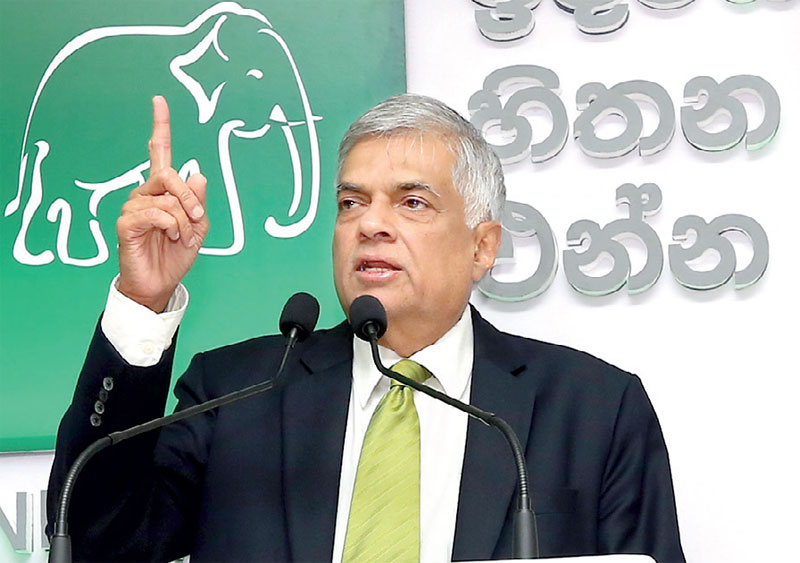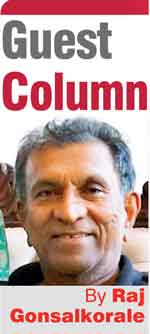Saturday Feb 14, 2026
Saturday Feb 14, 2026
Saturday, 23 July 2022 00:05 - - {{hitsCtrl.values.hits}}

President Ranil Wickremesinghe
A chattering crow lives out nine generations of aged men,but a stag’s life is four time a crow’s,and a raven’s life makes three stags old,while the phoenix outlives nine ravens,but we, the rich-haired Nymphs
daughters of Zeus the aegis-holder,outlive ten phoenixes.
 “The phoenix is an immortal bird associated with Greek mythology (with analogs in many cultures) that cyclically regenerates or is otherwise born again. Associated with the sun, a phoenix obtains new life by arising from the ashes of its predecessor. Some legends say it dies in a show of flames and combustion, others that it simply dies and decomposes before being born again. Exterior to the Linear B mention above from Mycenaean Greece, the earliest clear mention of the phoenix in ancient Greek literature occurs in a fragment of the Precepts of Chiron, attributed to 6th century BC Greek poet Hesiod. In the fragment, the wise centaur Chiron tells a young hero Achilles the following, describing the phoenix’s lifetime as 972 times the length of a long-lived human’s” – Wikipedia.
“The phoenix is an immortal bird associated with Greek mythology (with analogs in many cultures) that cyclically regenerates or is otherwise born again. Associated with the sun, a phoenix obtains new life by arising from the ashes of its predecessor. Some legends say it dies in a show of flames and combustion, others that it simply dies and decomposes before being born again. Exterior to the Linear B mention above from Mycenaean Greece, the earliest clear mention of the phoenix in ancient Greek literature occurs in a fragment of the Precepts of Chiron, attributed to 6th century BC Greek poet Hesiod. In the fragment, the wise centaur Chiron tells a young hero Achilles the following, describing the phoenix’s lifetime as 972 times the length of a long-lived human’s” – Wikipedia.
Prime Minister on six occasions, dead as a Dodo after the last general election, losing his own seat, and the party he led, the once mighty United National Party not securing even a single seat in Parliament and polling less than 250,000 nationally, Ranil Wickremesinghe has outlasted and outwitted all by rising on the Pohottuwa bed of strange bedfellows to be voted in as the next President of the country. He has now taken his oaths.
By whatever stretch of imagination, and political manoeuvring, this rise is remarkable. Hopefully, he will be the man for the season, to bring some relief for the millions of people who are on the brink of poverty and hunger, although opposition to his becoming the Prime Minister and now the President has increased. Protestors, perhaps some of them led by hijackers of the real and original Aragalaya movement, have vowed to continue their protests until the new president also resigns.
For the sake of the immediate need to address the critical economic debacle, the protest movement must consider a grace period for the new President and an emergency cabinet to deliver some relief measures results, while they, the protestors engage in island wide discussions on how the political system should change. The grace period could extend to say 12 months, and the holding of a general election based on a new system at that point. So far, it does not appear that the Aragalaya boundary extends beyond Colombo and Galle Face.
The immediate focus for everyone however should be the economy as it will not survive unless avenues for foreign income improves and increases. For this to happen, exports have to increase, foreign remittances need to increase and tourism has to pick up. It is unlikely any tourist will want to visit a country that only knows protests, queues, sporadic violence, and ongoing political instability. Foreign remittances, another key contributor to the economy, needs to pick up but if anyone thinks that someone who has some foreign currency earnings is going to remit all of it to a country in a state of anarchy, such thinkers should get their heads examined.
It is a catch 22 situation as queues will not end unless there is diesel and petrol and gas, and foreign remittances start flowing in. This will not happen unless there is foreign exchange to buy the fuel, and gas, and this will not happen unless the tourists and other means of earning foreign income are restored.
It reminds one of the Harry Belafonte and Odetta Holmes song “There is a hole in the bucket dear Lisa, dear Lisa” based on a Nursery Rhyme. This song epitomises the situation the country is facing now. For those who are not familiar with this song, with a simple example, it epitomises the need to attend to fundamentals that have an impact on desired outcomes.
It’s not protestations but structured, disciplined political discussions and engaging the public in these discussions that must happen now, as a system change cannot happen unless those who vote in or vote out a system participates, contributes, and then takes ownership of an alternative system. Any action counter to this would make the dysfunctional system even more dysfunctional.
President Wickremesinghe has indicated that he is out to change the political system of the country himself. He will have to articulate exactly what he means by this and the sooner he does it, the better for him and the country. He says rightly that the constitution process, which is the law of the land, has been followed and his Presidency is consequently legitimate.
However, for many Sri Lankans, the crux of the problem lies in the Constitution itself as they feel that the leaders and the lawmakers it has produced are the cause of the debacle faced by the country now. Corruption, unethical behaviour and immorality has come to define the inmates of this august building on the Diyawanna Lake and that is what the protestors have protested about. The credibility and the morality of leadership was amply demonstrated when a former President stated that his party fielded a candidate, and he lost “although we voted for him”. Given the result of the election and the numbers who voted in favour of the Acting President, this outlandish statement will strengthen the resolve of those who wish to change the system.
The constitution making process in Sri Lanka has had one common thread. That is the lack of consultations with the public. If this is to be repeated now, it is certain that the much-reviled system will not be changed. All countries have constitutions. However, unless they meet the aspirations of the people, and what they have delivered as outcomes to the people of the country do not meet their expectations, it can be said they are not worth the paper they are written on. The system therefore has to be changed so that it can produce leaders and lawmakers who are credible, ethical, moral, honest, and who will serve the aspirations of the people. Of course, if the people who elect leaders do not have these characteristics, the system, any system, will produce leaders and lawmakers of the ilk found in the Parliament.
President Wickremesinghe faces challenges he has never faced before. Amongst them, a Presidency that has no popular backing, a doddering economy, a populace suffering with no hope, a perception that he is a lackey of the Rajapaksa regime, and to date, no firm commitment from any country to provide urgent economic relief, except from India, and the disturbing belief amongst many that an external power is behind the fate that has befallen Sri Lanka.
Securing financial assistance as grants, loans and/or credit lines for fuel, gas, drugs and medical supplies, amongst other essentials, should be the President’s immediate priority. Reviving the export economy, tourism and incentivising the flow of foreign remittances should run parallel to this. In order to win the confidence of the people, besides doing the above, he should introduce additional legislation to strengthen measures to make the President and Parliamentarians more accountable to the people by making it the law of the land that the President and every parliamentarian should (a) declare their assets and liabilities publicly on an annual basis (b) subject them to submission of their tax returns to the tax office and compel audited tax returns to be made public, and (c) introduce penalties including loss of civic rights, confiscation of assets, high fines and jail sentences if it is found conclusively through a national or international enquiry that the President or Parliamentarians have acquired undeclared wealth in the name of third parties.
If President Wickremesinghe does not demonstrate he has succeeded in winning the confidence of the people by doing all of the above as a minimum, his tenure will be short lived.